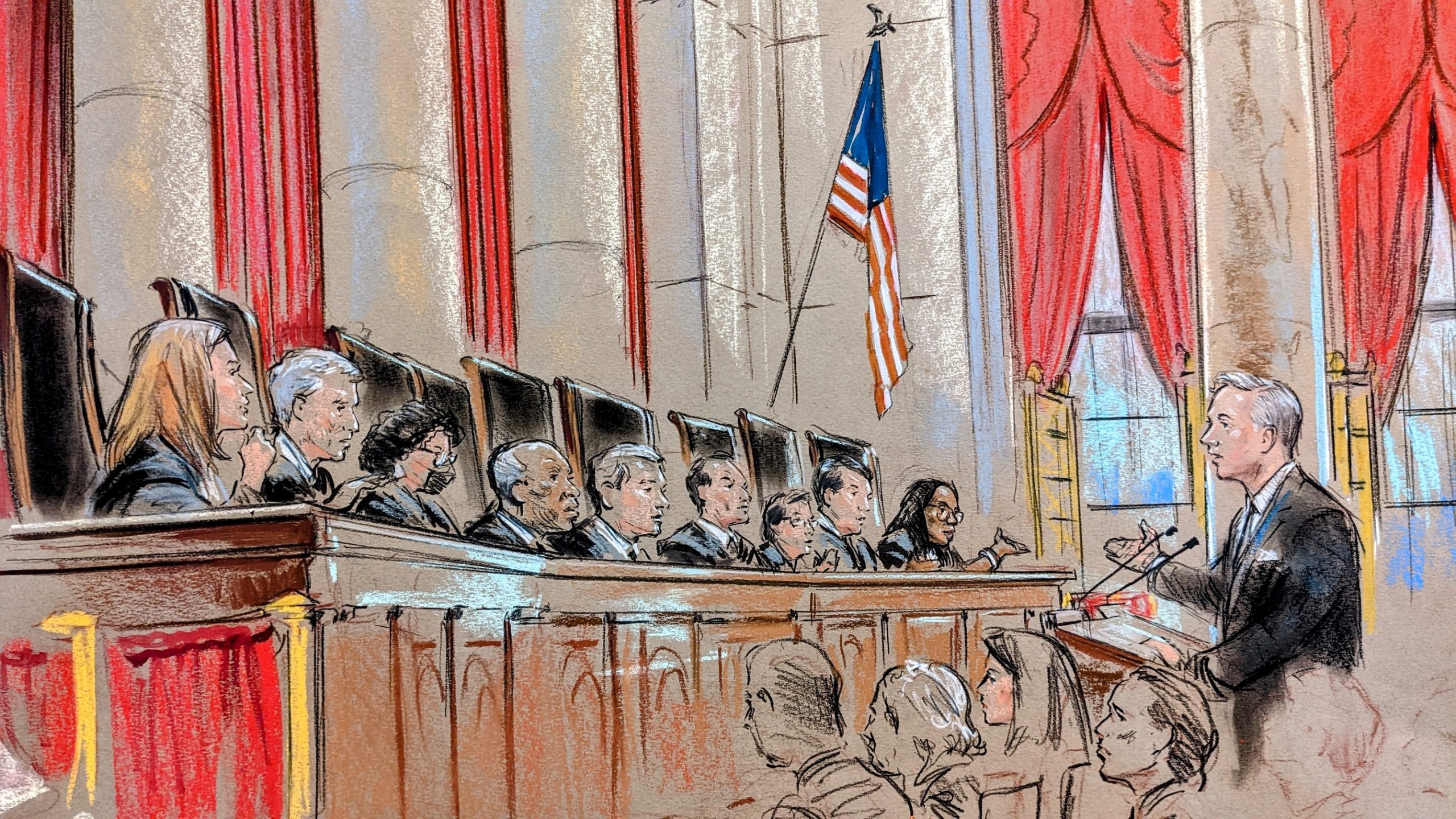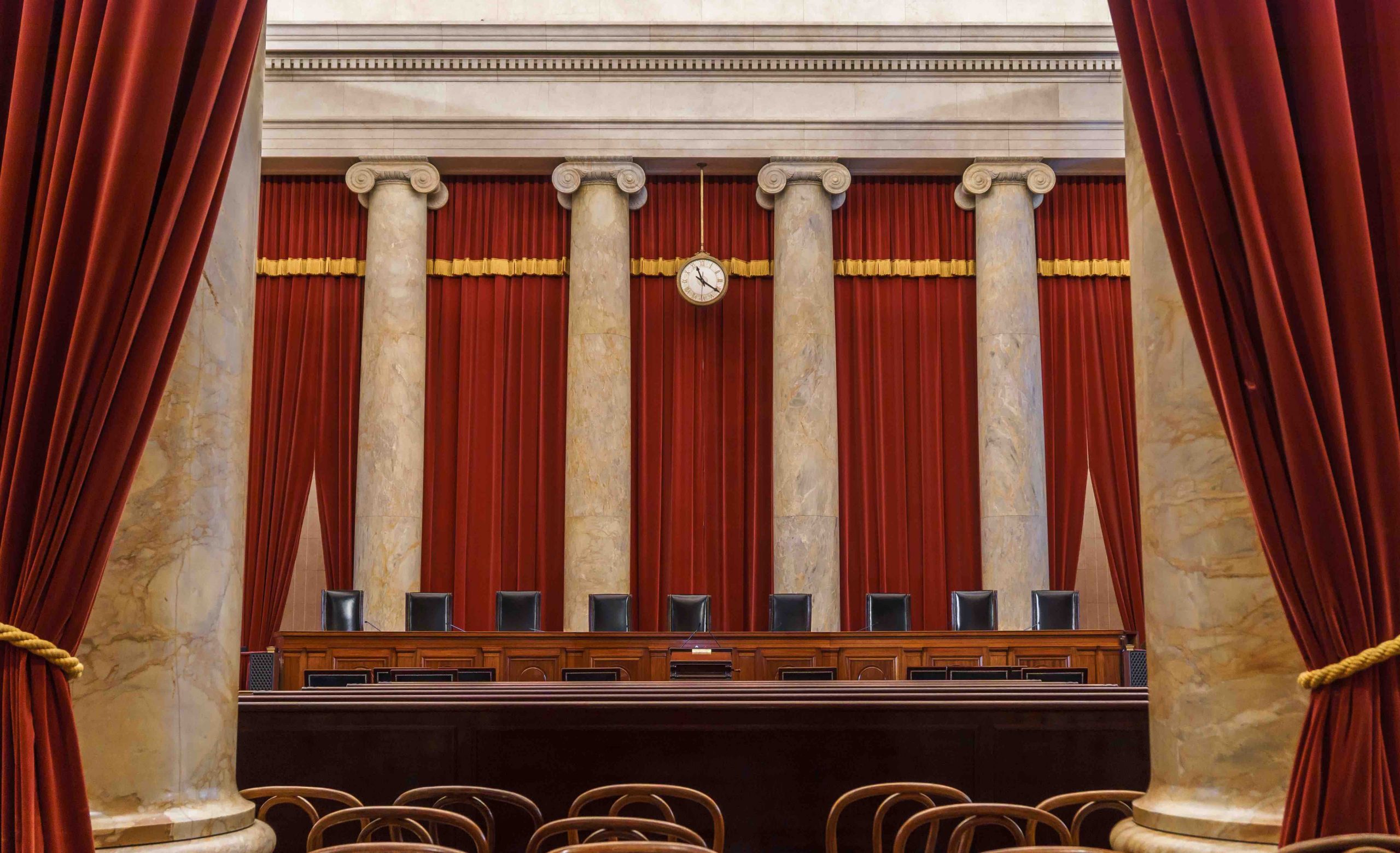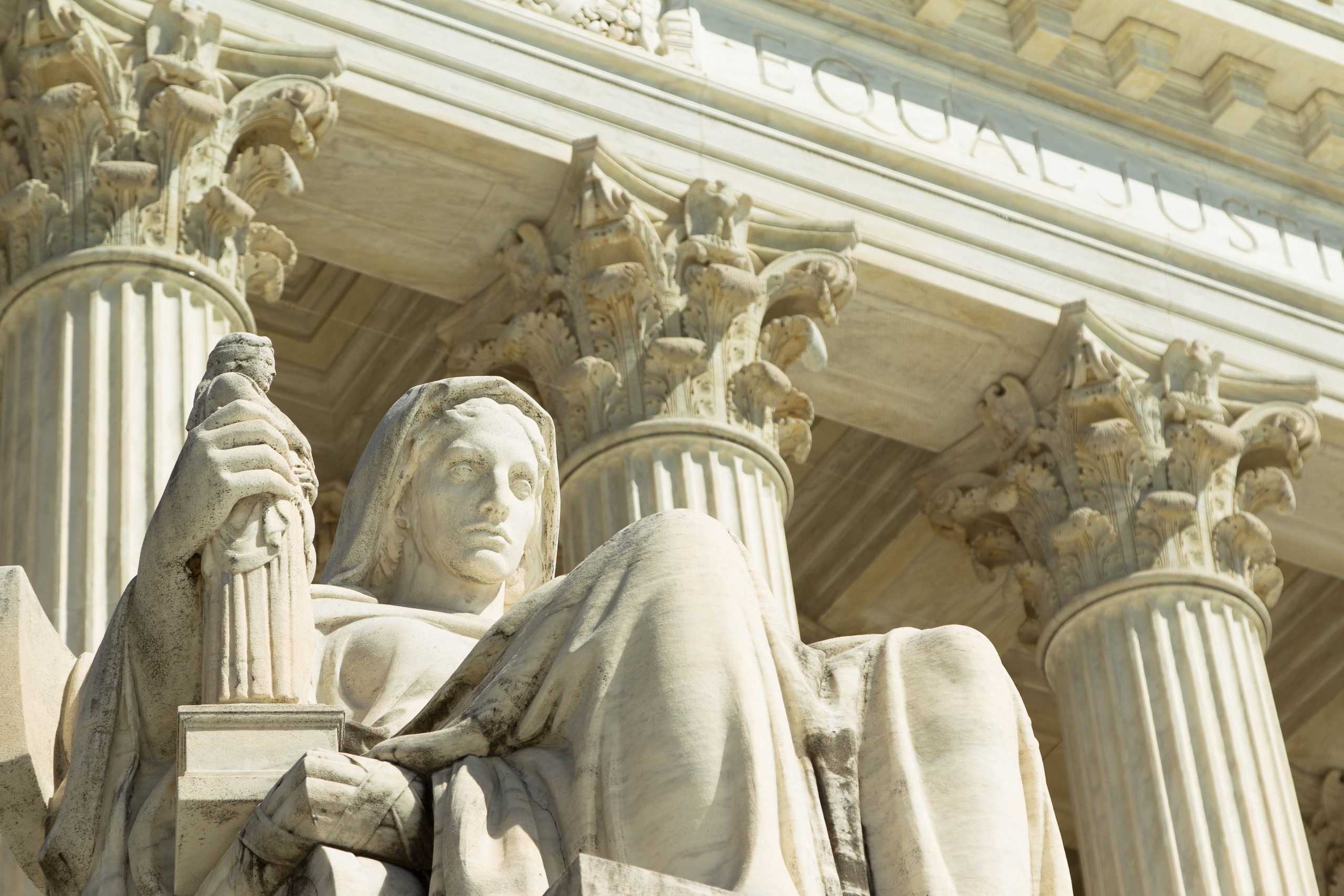Jurisdictional dispute appears to scramble the court’s usual ideological lines
Argument Analysis
on Nov 8, 2022
at 4:27 pm
Ashley Keller argues for Robert Mallory. (William Hennessy)
The Supreme Court heard oral argument on Tuesday in a challenge to a Pennsylvania law that allows any company doing business in the state to be sued there – even if the corporation is not headquartered there and the conduct at the center of the lawsuit occurred somewhere else. During nearly two hours of oral argument, the justices were divided – and not necessarily along ideological lines – on whether to uphold the law. Some justices appeared concerned that upholding the law could open the floodgates to lawsuits against corporations wherever they do business, while others worried that a ruling that strikes down the law would provide better treatment for corporations than individuals.
The legal doctrine at the center of the case, Mallory v. Norfolk Southern Railway Co., is known as personal jurisdiction – a court’s power to hear a lawsuit against a defendant. There are two types of personal jurisdiction. The first, known as “general” jurisdiction, allows a plaintiff to sue a company in the state where the company is incorporated or the state that constitutes its principal place of business, even when the conduct giving rise to the lawsuit occurred in another state. The second, known as “specific” jurisdiction, allows a lawsuit in a particular state if the company engaged in activities there that are connected to the lawsuit. A defendant also can agree to submit to jurisdiction in a state even if there wouldn’t otherwise be jurisdiction there.
The plaintiff in the case is Robert Mallory, a Virginia man who worked for Norfolk Southern, a Virginia-based railroad, in Virginia and Ohio. When Mallory was diagnosed with colon cancer, he filed a lawsuit in a Pennsylvania state court against Norfolk Southern, arguing that he had been exposed to toxic chemicals on the job. Under Pennsylvania law, Norfolk Southern was required to register with the state so that it could do business there; under state law, that registration gives Pennsylvania courts general jurisdiction over those corporations. Norfolk Southern argues – and the lower courts agreed – that the Pennsylvania scheme violates the 14th Amendment’s due process clause, which guarantees fair treatment by the government, by giving state courts jurisdiction over out-of-state corporations in all circumstances.
Representing Mallory, lawyer Ashley Keller stressed the long history of consent-by-registration laws. By 1868, when the 14th Amendment was ratified, he said, “every state in the union had at least one and often several” such laws – which means that Pennsylvania’s law is consistent with how the amendment would have been commonly understood when it was adopted. “Fidelity to the original public meaning of the 14th Amendment” in this case, Keller contended, “means that the little flesh-and-blood guy wins and the Fortune 500 company loses.”
Some justices pushed back against Mallory’s efforts to rely on the history of consent laws and Pennsylvania Fire Insurance Co. of Philadelphia v. Gold Issue Mining & Milling Co., a decision holding that an out-of-state corporation had agreed to jurisdiction in Missouri when, as required by state law, it appointed an agent to accept the legal papers that initiate a lawsuit.
Chief Justice John Roberts told Keller that “history and tradition move on.” And Roberts suggested that the Supreme Court’s 1945 decision in International Shoe Co. v. Washington, holding that a state can have specific jurisdiction over an out-of-state defendant when the defendant has sufficient contacts with the state that it would not be unfair for the defendant to face a lawsuit there, had “sort of relegate[d]” cases like Pennsylvania Fire “to the dustbin of history.”
Keller responded that the Supreme Court has never actually overruled its decision in Pennsylvania Fire. But Justice Elena Kagan was also skeptical of his efforts to rely on that decision and on the history of such laws. “For almost a century,” she observed, “we have lived under rules that are entirely different from the ones that you’re suggesting we now adopt.” The “whole idea of consent-by-registration,” she reasoned, “came about because it was necessary” to give state courts jurisdiction over out-of-state corporations for their conduct within the state. The states invented the idea of “fictional consent” to jurisdiction, she explained, even if the out-of-state corporations were not actually consenting. But the court’s decision in International Shoe, she continued, “comes along and obviates the need” for the fictional consent, because the out-of-state corporations could be sued in state courts as long as they had enough contact with the state.
Keller acknowledged that a ruling in his client’s favor “would definitely change the jurisdictional landscape.” But large corporations, he stressed, are sophisticated actors who can choose either to leave states that impose consent-by-registration laws or seek change through the political process.
Justice Ketanji Brown Jackson was more sympathetic to Mallory. She did not “see necessarily a conflict between International Shoe” and consent-by-registration laws. The Supreme Court, she noted, has ruled that personal jurisdiction “is an individual right” that “can be waived” as long as the person or entity waiving the right does so knowingly and voluntarily.
Representing Norfolk Southern, lawyer Carter Phillips rejected the idea that his client had voluntarily consented to be sued in Pennsylvania. “This is not consent in the sense that anybody thinks about consent,” he insisted. Rather, he said, Norfolk Southern had to register in Pennsylvania so that it could continue to operate there.
Carter Phillips argues for Norfolk Southern Railway Company. (William Hennessy)
Justice Sonia Sotomayor pushed back. Norfolk Southern, she observed, has more employees and more miles of railroad tracks in Pennsylvania than it does in any other state – including Virginia. How can Norfolk Southern say, she asked, that it was coerced into consenting to general jurisdiction? Perhaps in a particular case there might be coercion, she conceded, but “I don’t see how we could say there’s coercion for a company in your situation.”
Justice Neil Gorsuch joined Sotomayor and Jackson in appearing to side with Mallory and against the railroad. In 1990, he emphasized, the Supreme Court held in Burnham v. Superior Court that a father from New Jersey could be served with a lawsuit while visiting his children in California – a form of jurisdiction known as “tag” jurisdiction. If individual defendants can be required to appear in state court based on “tag” jurisdiction, Gorsuch asked, why can’t corporations be required to comply with “more or less” the same rules?
Justice Brett Kavanaugh, however, was more concerned about the effect on the business community if the court sides with Mallory. He noted that right now Pennsylvania is the only state to use a consent-by-registration law for out-of-state corporations. But if Mallory prevails, he warned, “every state could have a statute like this, which would mean… that every business” could be sued anywhere in the country that it does business.
Justice Samuel Alito acknowledged that Norfolk Southern is a large corporation “that can litigate anyplace in the country” and might not face serious “practical consequences” if it can be haled into court anywhere it does business. But Alito worried aloud that smaller companies would face real problems if a state can exercise jurisdiction over them based on a consent-by-registration law.
Arguing on behalf of the Biden administration, which sided with the railroad, Deputy Solicitor General Curtis Gannon echoed Kavanaugh and Alito’s concerns. He urged the justices to reject the “jurisdictional free-for-all” for which Mallory argues. In particular, he reminded the justices, a decision upholding Pennsylvania’s consent-by-registration requirement could threaten international relations by allowing lawsuits in state courts against foreign corporations.
Deputy Solicitor General Curtis Gannon argues for respondent Norfolk Southern Railway Company. (William Hennessy)
Sotomayor downplayed the risk to out-of-state corporations, asserting that many states won’t enact similar laws because they wouldn’t want to have disputes without any connection to the state clogging up their courts. And in any event, she added, there are other “guardrails” to protect out-of-state defendants from being haled into distant or inconvenient state courts.
A decision in the case is expected sometime next year.
This post was originally published at Howe on the Court.








